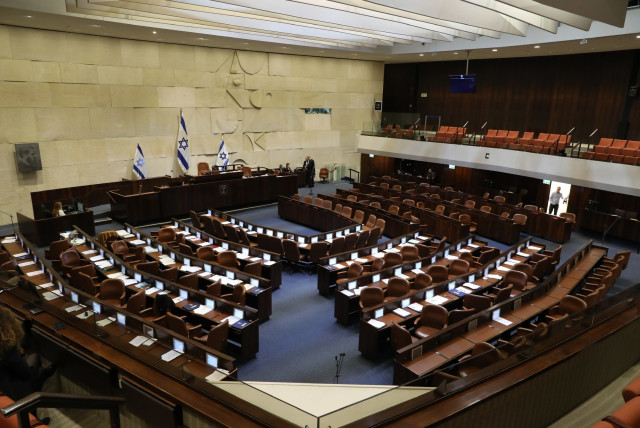Israel's electoral system prevents accountable governance - opinion

In the system of democracy currently in place in Israel, Knesset members represent the public. This is indisputable. However, the ties between the public and its representatives are very weak.
One of the key arguments behind the proposals for what some refer to as a coup and others as the reform of our system of government is that the changes in question will strengthen the power of the public’s elected representatives and consequently, of the public itself vis-à-vis unelected officials and bureaucrats, such as judges, legal advisers, and civil servants.
There are several flaws in this assertion, such as the identification of the public’s elected representatives exclusively or mainly with the Knesset coalition, or the fact that even today, the coalition and government wield almost unlimited power. Here, we would like to highlight a different flaw that relates to the ties between the public and its elected representatives.
In the system of democracy currently in place in Israel, Knesset members represent the public. This is indisputable. In practice, however, the ties between the public and its representatives are very weak.
In comparison with other countries, the Israeli public’s ability to influence who will serve as members of the Knesset and to reward or sanction them for their actions and the MKs’ obligation to keep their promises and fulfill voters’ expectations are minimal. In professional jargon, Israeli politics suffer from a severe deficiency in responsiveness and accountability.
Israel's electoral system prevents MKs from being responsive and accountable
This is rooted primarily in the electoral system. Electoral systems have two mechanisms to encourage legislators’ accountability and responsiveness: personal elections and regional elections. Neither of these exists in Israel. There are no constituencies since the entire country is a single electoral district encompassing all 120 members of the Knesset.
There are no individual elections because we only vote for candidate lists and have no ability on Election Day to influence who will be on the list and their ranking. We don’t even see their names on the ballot slips (except, perhaps, the person at the top of the list). Although some parties conduct primaries, others do not and even in those that do, only a small number of the party supporters vote in the primaries.
There are many different systems of regional and personal elections. Each electoral district may elect only a single legislator (as in the United States and Great Britain); alternatively, there may be larger districts that elect multiple representatives (as in most countries of Western Europe). Similarly, elections can be exclusively personal, with no candidate lists; but there are also various open systems in which voters cast their ballot for a particular list but can – or must – designate one or more of its members whom they specifically support.
In these systems, the number of votes that individual candidates receive may influence their final rank on the list. Each method has its advantages and disadvantages, but all allow voters a greater say on the identity of their representatives and make it possible to reward or sanction specific legislators for their actions.
THIS PROVIDES incumbent representatives with a strong incentive to serve the public and in the case of regional elections, their geographical constituency. This is of special benefit to the periphery, which is usually underrepresented in national politics.
In this respect, the Israeli system is an outlier. In most democracies, elections have both personal and regional components. In the few where there is no individual component, such as Spain, Portugal and Costa Rica), there are electoral districts. In the few that do not have such districts, such as the Netherlands and Slovakia, there is a personal component.
In fact, of the 35 countries that can be defined as advanced democracies (a member of the OECD and rated democratic by standard international indexes), Israel is the only one with neither of these features.
The result is an electoral system with extremely limited responsiveness and accountability. The best solution, of course, would be to introduce an individual and/or regional component into Knesset elections, as many have recommended, including think tanks that otherwise agree about very little, such as the Kohelet Forum and the Israel Democracy Institute.
But this analysis of the Israeli political system also pulls out the rug from under one of the main arguments of the supporters of the current coalition’s initiatives. If their true goal is to enhance the public’s influence on policymaking, the appropriate way to do so is to modify the electoral system; that is, to introduce individual and regional components that would enhance elected representatives’ responsiveness and accountability to the public.
But as long as we are stuck with the current system, with its abysmal level of Knesset members’ responsiveness and accountability, there is no guarantee that giving the coalition even more power would serve the public in any way.
We must emphasize that modifying the electoral system is not the only way to increase the public’s influence on policymaking. To accomplish this, we could and should improve the Knesset’s oversight of the government, decentralize power from the national government to local authorities, encourage parties to allow more internal democracy and adopt mechanisms of participatory democracy, such as citizen assemblies.
The fact that the current coalition is not promoting any of these changes should certainly arouse our suspicion as to the true goals of its legislative proposals.
Dr. Assaf Shapira is the director of the Political Reform program at the Israel Democracy Institute. Prof. Yaniv Roznai is a vice dean at the Harry Radzyner Law School, and co-director at the Rubinstein Center for Constitutional Challenges, Reichman University.
Jerusalem Post Store
`; document.getElementById("linkPremium").innerHTML = cont; var divWithLink = document.getElementById("premium-link"); if (divWithLink !== null && divWithLink !== 'undefined') { divWithLink.style.border = "solid 1px #cb0f3e"; divWithLink.style.textAlign = "center"; divWithLink.style.marginBottom = "15px"; divWithLink.style.marginTop = "15px"; divWithLink.style.width = "100%"; divWithLink.style.backgroundColor = "#122952"; divWithLink.style.color = "#ffffff"; divWithLink.style.lineHeight = "1.5"; } } (function (v, i) { });

